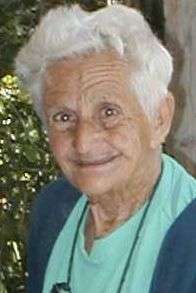Amelia Penichet
| Amelia Penichet-Rodriguez | |
|---|---|
 In 2003 in Cuba | |
| Born |
December 2, 1916 New York City, New York |
Amelia Penichet (born Amelia Rogelia Penichet-Rodriguez on December 2, 1916 in New York City, New York) is a journalist and historian living in Cuba. In her neighborhood (Miraflores, Boyeros, Havana) in Cuba she is referred as the Viejita de los Perros (the old lady of the dogs).
Family
Ms. Penichet was the child of Wenceslao Penichet-Gonzalez and Amelia Margarita Rodriguez-Gonzalez (1891–1916). When she was less than two weeks old, her mother died and her father gave her up to her maternal grandmother. Her grandmother returned to Cuba with her granddaughter and her daughter's body. Ms. Penichet would only see her father then on a few occasions through the years. She was raised by her grandmother and her uncle, Armando Rodriguez-Gonzalez. On February 23, 1941, she married Armando Triscornia-Martin, a former local judge during the early years of the Communist revolution. She would never have children because her grandmother instilled a fear in her that if she were to have children she would die like her mother.
Return to the US
She also believed that if she ever returned to where she was born, she would die soon afterwards. In 1995, with the assistance of her cousin's grandson Alonso R. del Portillo and Congresswoman Ileana Ros-Lehtinen, she was able to get her US passport and return to the United States after a 79-year absence. Since then, she has traveled to the United States three more times, but never to New York.
Work
Ms. Penichet wrote for many years in the El Diario de la Marina about cultural and historical importance and had a column "Notas de Los Pinos" in El Mundo. She is dedicated to the welfare of animals, especially dogs, which earned her nickname Viejita de los Perros (the old lady of the dogs). She has lived at the same place all her life (her home has been rebuilt on the same spot three times).
References
- Diario de La Marina (Spanish)
- http://www.nacion.cult.cu/ (Spanish)